Delhi pollution: Air quality nears ‘poor’ level in Delhi-NCR, AQI at 302; schools to operate in….
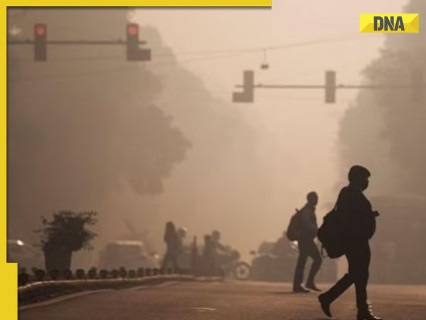
As recorded by the Central Pollution Control Board at 6 am, the AQI of Anand Vihar was at 357, Ashok Vihar at 318, Bawana at 341, Burari Crossing at 320, Jahangirpuri at 354, Chandni Chowk at 293 and Dwarka Sector 8 at 332.
Devendra Fadnavis set to be next CM of Maharashtra? Eknath Shinde hints, ‘There is no obstacle from…’

Amid the suspense over the Chief Ministerial face in Maharashtra, outgoing Maharashtra Chief Minister and Shiv Sena leader Eknath Shinde has hinted at Fadnavis’s name for the post.
Hemant Soren to take oath as Jharkhand’s 14th CM today, top INDIA Bloc leaders to attend ceremony

Hemant Soren-led JMM steered the INDIA bloc to victory with 56 seats in the 81-member Jharkhand assembly. The JMM won 34 seats, while its allies secured 22 seats.
Cyclone Fengal: IMD issues ‘orange’ alert, heavy rains to continue in Tamil Nadu; schools, colleges to remain…

IMD recently issued a warning stating that a deep depression over the southwest Bay of Bengal will intensify into a cyclonic storm as it moves northwestward.
Appeals court rules Texas has right to build razor wire border wall to deter illegal immigration: ‘Huge win’
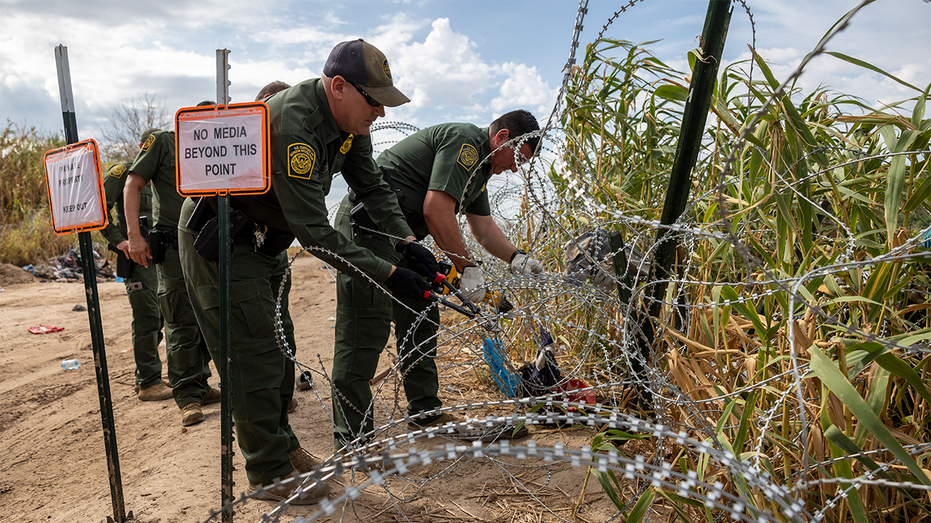
A federal appeals court on Wednesday ruled that Texas has the right to build a razor wire border wall to deter illegal immigration into the Lone Star State. Texas Gov. Greg Abbott announced the ruling on X, saying President Biden was “wrong to cut our razor wire.” “We continue adding more razor wire border barrier,” the Republican leader wrote. Wednesday’s 2-1 decision by the 5th U.S. Circuit Court of Appeals clears the way for Texas to pursue a lawsuit accusing the Biden administration of trespassing without having to remove the fencing. TRUMP SAYS MEXICO WILL STOP FLOW OF MIGRANTS AFTER SPEAKING WITH MEXICAN PRESIDENT FOLLOWING TARIFF THREATS It also reversed a federal judge’s November 2023 refusal to grant a preliminary injunction to Texas as the state resisted federal efforts to remove fencing along the Rio Grande in the vicinity of Eagle Pass, Texas. Circuit Judge Kyle Duncan, a Trump appointee during the president-elect’s first term, wrote for Wednesday’s majority that Texas was trying only to safeguard its own property, not “regulate” U.S. Border Patrol, and was likely to succeed in its trespass claims. LIBERAL NANTUCKET REELS FROM MIGRANT CRIME WAVE AS BIDEN SPENDS THANKSGIVING IN RICH FRIEND’S MANSION Duncan said the federal government waived its sovereign immunity and rejected its concerns that a ruling by Texas would impede the enforcement of immigration law and undermine the government’s relationship with Mexico. He said the public interest “supports clear protections for property rights from government intrusion and control” and ensuring that federal immigration law enforcement does not “unnecessarily intrude into the rights of countless property owners.” Republican Attorney General Ken Paxton called the ruling a “huge win for Texas.” “The Biden Administration has been enjoined from damaging, destroying, or otherwise interfering with Texas’s border fencing,” Paxton wrote in a post on X. “We sued immediately when the federal government was observed destroying fences to let illegal aliens enter, and we’ve fought every step of the way for Texas sovereignty and security.” The White House has been locked in legal battles with Texas and other states that have tried to deter illegal immigration. In May, the full 5th Circuit heard arguments in a separate case between Texas and the White House over whether the state can keep a 1,000-foot floating barrier on the Rio Grande. The appeals court is also reviewing a judge’s order blocking a Texas law that would allow state officials to arrest, prosecute and order the removal of people in the country illegally.
Trump says Mexico will stop flow of migrants after speaking with Mexican president following tariff threats
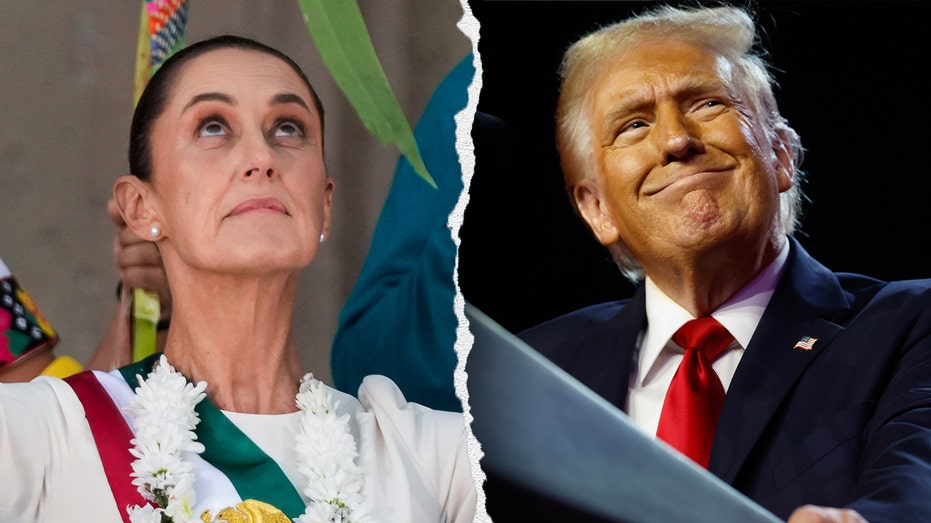
President-elect Trump said he spoke with Mexican President Claudia Sheinbaum Pardo, saying she has agreed to “stop Migration through Mexico, and into the United States” following threats this week to significantly tariff goods from Mexico. Trump vowed to impose 25% tariffs on Mexico and Canada if both nations failed to do more to stop the flow of illegal immigrants and drugs into the U.S. Sheinbaum, who recently took office, said on Wednesday that Mexico would retaliate if Trump followed through on his promise. TRUMP LIKELY TO MAKE SEVERAL BORDER SECURITY MOVES ON FIRST DAY, SAYS EXPERT “If there are U.S. tariffs, Mexico would also raise tariffs,” Sheinbaum said during a press conference. On Wednesday, Trump said he spoke with his Sheinbaum about the matter. “Just had a wonderful conversation with the new President of Mexico, Claudia Sheinbaum Pardo,” he wrote on Truth Social. “She has agreed to stop Migration through Mexico, and into the United States, effectively closing our Southern Border. We also talked about what can be done to stop the massive drug inflow into the United States, and also, U.S. consumption of these drugs. It was a very productive conversation!” MEXICAN PRESIDENT MIGHT BE CHANGING VIEW ON US AS TRUMP WIN SENDS WARNING TO RULING SOCIALISTS In a subsequent post, he said that: “Mexico will stop people from going to our Southern Border, effective immediately. THIS WILL GO A LONG WAY TOWARD STOPPING THE ILLEGAL INVASION OF THE USA. Thank you!!!” Sheinbaum and Trump spoke by phone later on Wednesday, the Mexican president said on social-media platform X, adding the two discussed “strengthening collaboration on security issues” and that the conversation was “excellent,” Reuters reported. Trump has long complained that Mexico has failed to do enough to stop the flow of migrants on its side of the southern border. Trump also threatened to impose an additional 10% tariff on China over the massive amounts of fentanyl coming into the U.S. from Mexico. In response, the China Daily newspaper – which is run by the Chinese Communist Party – published an editorial Tuesday saying, “The excuse the president-elect has given to justify his threat of additional tariffs on imports from China is far-fetched,” according to Reuters.
Feds can’t destroy razor wire Texas installed near Eagle Pass, appeals court rules
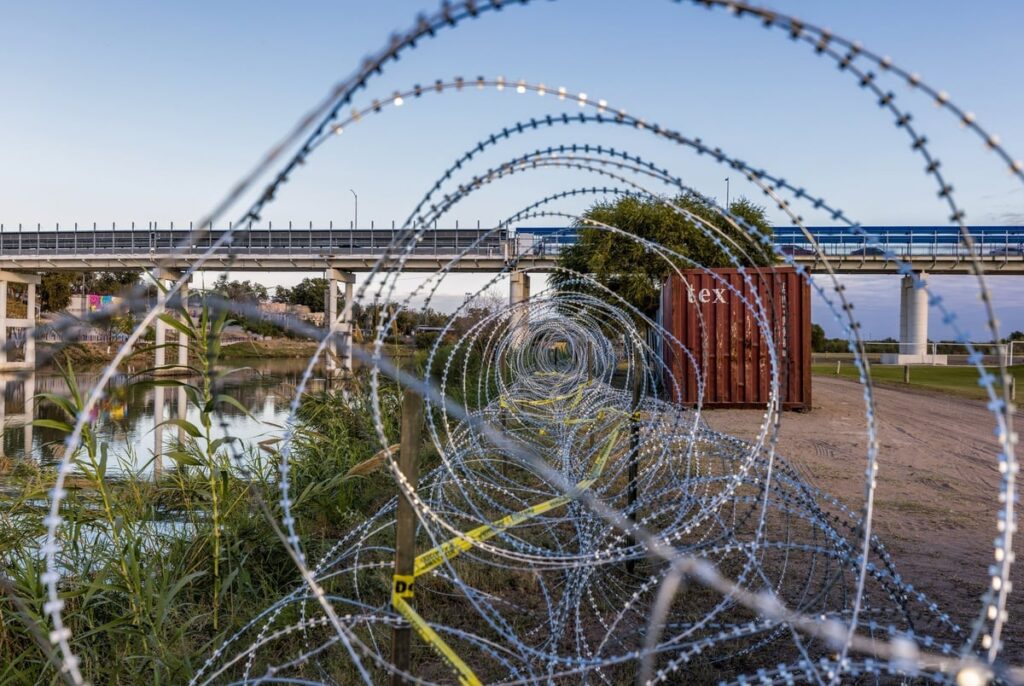
Texas Attorney General Ken Paxton had sued the Biden administration after Border Patrol agents had cut the razor wire.
Israel-Hezbollah ceasefire holds as UN chief sees ‘ray of hope’
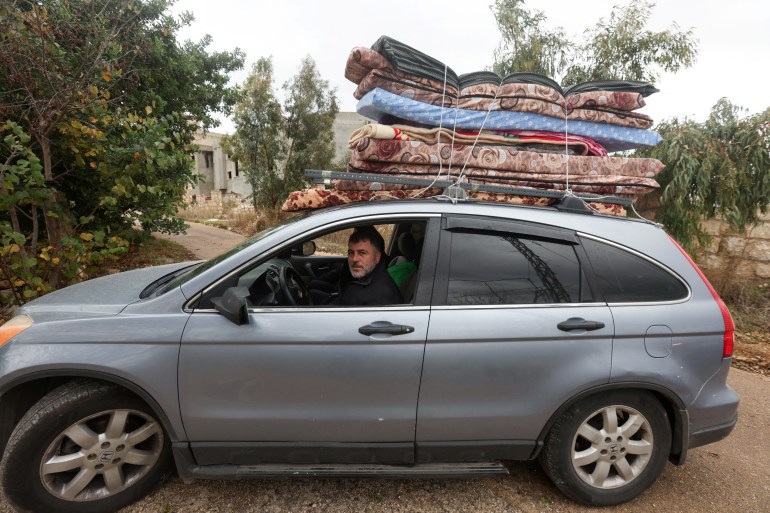
A ceasefire between Israel and Hezbollah has appeared to hold on its first day as thousands of displaced people set out to return to their homes in southern Lebanon despite Israel’s military announcing restrictions on movement in the area. Israeli military spokesperson Avichay Adraee said on X on Wednesday that residents would be barred from travelling south of the Litani River, about 30km (20 miles) from the Israeli border, from 5pm (15:00 GMT) until 7am (05:00 GMT) on Thursday. He said displaced residents would not be allowed to return to villages the army had ordered them to leave as Israeli forces were still present in the area. The ceasefire, which was brokered by the United States and came into effect on Wednesday morning, gives Israeli forces and Hezbollah fighters 60 days to withdraw from southern Lebanon. Israeli Prime Minister Benjamin Netanyahu said he instructed the military not to allow residents back into the Lebanese villages near the Israel-Lebanon border. Lebanon’s army, which has been given the responsibility of ensuring the ceasefire lasts and will take control of southern Lebanon as Israel gradually withdraws its forces, said it has begun deploying additional troops south of the Litani. Earlier on Wednesday, the Israeli military Chief of Staff Herzi Halevi said Israel’s enforcement of the ceasefire would be determined by whether Hezbollah keeps to the agreement. “Hezbollah operatives who approach our troops, the border area and the villages within the area we have marked will be struck. … We are preparing, getting ready for the possibility that this [ceasefire] approach won’t succeed,” he said. Hezbollah claims ‘victory’ In its first public statement since the truce came into effect, Hezbollah said it achieved a “victory” over Israel. “Victory from God almighty was the ally of the righteous cause,” the statement from the Iran-algned group said. Hezbollah fighters “will remain in total readiness to deal with the Israeli enemy’s ambitions and its attacks”, the statement added. Earlier, Lebanon’s caretaker Prime Minister Najib Mikati called for unity after what he said was the “most cruel phase in Lebanese history”. Israeli Prime Minister Benjamin Netanyahu told US President Joe Biden that his government had approved the ceasefire and that he appreciated his “understanding that Israel will maintain its freedom of action in enforcing it”, his office said. Biden released a joint statement with French President Emmanuel Macron, emphasising that both countries “will work with Israel and Lebanon to ensure this arrangement is fully implemented and enforced”. Hezbollah began launching rockets towards Israel on October 8, 2023, in what it said was solidarity with Palestinians in Gaza. Cross-border attacks persisted for months. Israel’s military escalated the fighting in September, bombarding areas across the country and then launching a ground offensive in October. At least 3,823 people have been killed and 15,859 wounded in Israeli attacks in Lebanon since October 2023, according to Lebanese health authorities. ‘Ray of hope’ Despite Israel’s warning of restrictions on movement, displaced Lebanese residents piled into cars carrying mattresses and drove through the heavily bombed southern city of Tyre to go back to areas they had been forced to leave. Shams Fakih, a resident from Kfar Kila in southern Lebanon, told Al Jazeera: “Once they let us return to our village, we will go there, but now we’re going to another village [in] Debeen, where my brother who was fighting for the resistance was killed.” Others were not able to return to their home villages as Israeli forces had yet to withdraw from the area. Hussam Arrout, a father of four, told the Reuters news agency that he was desperate to go home, but Israeli forces were still in southern Lebanon. “The Israelis haven’t withdrawn in full. They’re still on the edge. So we decided to wait until the army announces that we can go in. Then we’ll turn the cars on immediately and go to the village,” he said. Displaced Lebanese Assaad Bzih is driving with his belongings piled on top of his car near his destroyed home in Zibqin in southern Lebanon [Aziz Taher/Reuters] After the ceasefire announcement, United Nations Secretary-General Antonio Guterres said the agreement was the “first ray of hope” in the regional war. “It is essential that those who signed the ceasefire commitment respect it in full,” he said in a televised statement during a visit to Lisbon, adding that UN peacekeeping forces in Lebanon were ready to monitor the ceasefire. “I received an auspicious sign yesterday, the first ray of hope for peace amid the darkness of the past months,” he said, adding: “It is a moment of great importance, especially for civilians who were paying an enormous price of this spreading conflict.” Guterres also reiterated his call for a ceasefire in Gaza. Adblock test (Why?)
Will the US-brokered ceasefire in Lebanon hold?

Agreement ends more than a year of fighting between Hezbollah and Israeli military. At least 3,823 people killed, more than 1.2 million displaced and estimated economic losses of $8.5bn. Lebanon’s prime minister is calling Hezbollah’s nearly 14-month conflict with Israel the “cruellest phase” in the country’s history. The ceasefire offers hope for a return to peace and a chance for people to rebuild their lives. But the agreement has raised questions: Is the underfunded Lebanese army in a position to enforce the terms of the deal? And how fragile will the situation be in the next 60 days, when Israeli troops and Hezbollah fighters withdraw from southern Lebanon? Presenter: Tom McRae Guests: Jamal Ghosn – Political commentator Randa Slim – Director of the Conflict Resolution Program at the Middle East Institute Drew Mikhael – Non-resident fellow at the Tahrir Institute of Middle East Policy Adblock test (Why?)
FBI confirms Trump cabinet picks targeted with bomb threats, ‘swatting’
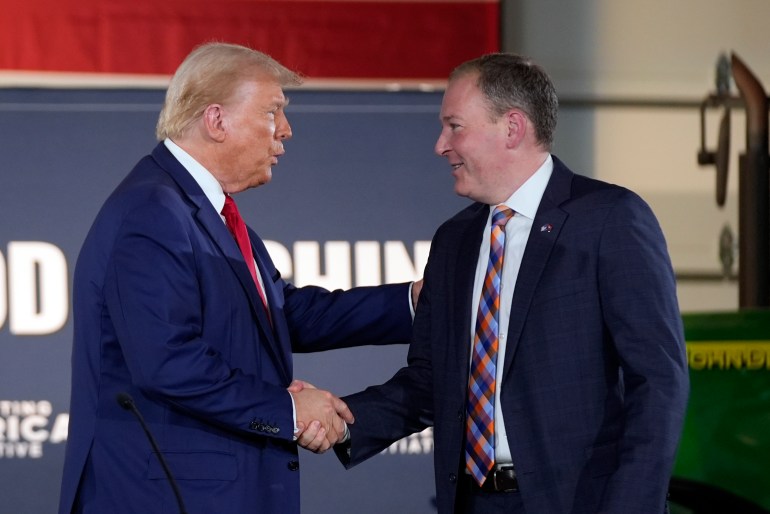
The Federal Bureau of Investigation (FBI) in the United States has issued a statement confirming that several picks for President-elect Donald Trump’s incoming administration have been the subject of threats in the days since their nominations. “The FBI is aware of numerous bomb threats and swatting incidents targeting incoming administration nominees and appointees, and we are working with our law enforcement partners,” the bureau said on Wednesday. “We take all potential threats seriously and, as always, encourage members of the public to immediately report anything they consider suspicious to law enforcement.” The short statement echoed reports from within the Trump transition team itself. Earlier in the day, Trump spokesperson Karoline Leavitt indicated that cabinet nominees such as Lee Zeldin and Elise Stefanik were among those targeted. “Last night and this morning, several of President Trump’s Cabinet nominees and Administration appointees were targeted in violent, unAmerican threats to their lives and those who live with them,” she wrote in a press release. Zeldin, a former congressman from New York, posted about his experience on social media, confirming he and his family were safe. “A pipe bomb threat targeting me and my family at our home today was sent in with a pro-Palestinian themed message,” said Zeldin, who has been tapped by Trump to lead the Environmental Protection Administration (EPA). Stefanik, a US representative from New York and Trump’s pick to serve as ambassador to the United Nations, issued a statement through her office explaining that she too had been the subject of a bomb scare. “This morning, Congresswoman Elise Stefanik, her husband, and their three year old son were driving home to Saratoga County from Washington for Thanksgiving when they were informed of a bomb threat to their residence,” the statement said. “New York State, County law enforcement, and US Capitol Police responded immediately with the highest levels of professionalism.” Citing an anonymous law enforcement official, The Associated Press news agency also reported that incoming chief of staff Susie Wiles, former attorney general pick Matt Gaetz, and his replacement Pam Bondi were targeted as well. The FBI cited instances of “swatting”, in which law enforcement is called to a home or office under false pretences, creating a potentially dangerous situation for the person inside. Recent incidents like the attack on the US Capitol on January 6, 2021, have heightened concerns about the threat of political violence in the US. That riot saw thousands of Trump supporters storm the US Congress in an attempt to disrupt the certification of the 2020 presidential election. A 2023 investigation from the news agency Reuters found 213 cases of political violence happened in the years since the Capitol riot. Concerns over political violence continued into the 2024 election cycle, when Trump faced two apparent assassination attempts. One, in July, resulted in a bullet grazing Trump’s ear while he stood on stage at a rally in Butler, Pennsylvania. An audience member, firefighter Corey Comperatore, was killed in the attack. A second attempt on Trump’s life was averted outside his golf resort in West Palm Beach, Florida, in September, when a gunman was discovered hiding in the bushes. Also in September, the city of Springfield, Ohio, also received hoax bomb threats at its government buildings, after Trump depicted the local Haitian American population as a threat. In the aftermath of those threats, politicians on both sides of the aisle called for voters to “turn down the temperature” on hostile political rhetoric. One study even found that tolerance for “partisan violence” declined among Republicans after the assassination attempts. “We cannot, we must not go down this road in America. We’ve traveled it before throughout our history. Violence has never been the answer,” President Joe Biden, a Democrat, said in a speech. Then-candidate Donald Trump greets Lee Zeldin at a campaign event at a Pennsylvania farm on September 23 [Alex Brandon/AP Photo] Trump, meanwhile, accused Democrats of spurring the violence, though critics point out he has shown little aversion to painting political opponents as dangerous enemies. “Because of this Communist Left Rhetoric, the bullets are flying, and it will only get worse!” Trump wrote on social media in September. He also told Fox News that Biden and Vice President Kamala Harris, his rival in the presidential race, were to blame. “Their rhetoric is causing me to be shot at, when I am the one who is going to save the country, and they are the ones that are destroying the country – both from the inside and out,” he said. There is, however, no evidence that any of the attacks against Trump were motivated by his Democratic rivals. Still, on Wednesday, Leavitt pointed to Trump as a role model for how to handle the recent threats. “With President Trump as our example, dangerous acts of intimidation and violence will not deter us,” Leavitt said. Adblock test (Why?)

